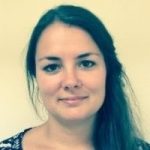Can we make science more open? The REBLAB initiative
Rosanne Hertzberger, once a molecular microbiology researcher at Washington University, is now a freelance writer. She gave a talk in Wageningen on 15 February, titled ‘REBLAB: from open access to open kitchen science’. In this talk, she shared her thoughts on how we could make science more open.
The bubble called academia
The opening of her talk is striking: “I love science. I think being a scientist is the best job in the world. So I envy you. But I also don’t envy you.” She mentions the downsides of academia; one is the hard work and anxiety that often comes with it, another is the lack of openness. As a freelance writer, she can write about what she wants and share as she pleases. But in academia, things are different: “I follow researchers on Twitter. I see they go to conferences, but all I see are pictures of beaches and palm trees. I don’t see any of their work! Where are their slides? Where are their posters?”
It is true: Only when we leave academia, we notice the bubble that it really is. When you can no longer access articles for free, it becomes very difficult to keep up with research. And as research often requires expensive materials, we might not be able to actively contribute ourselves. As Rosanne concludes, it seems practically impossible to do science outside of academia – in most fields at least.
REBLAB: making oversharing the standard
This is why she started REBLAB. The REBLAB initiative goes a step beyond open access publishing, emphasising the value of sharing more than only full-text articles after the completion of a study. In Rosanne’s words: “It should be standard procedure to overshare.” Researchers should share all things throughout the research process that might be relevant to others. Think of notes, small observations, slides, and calibrations (even if these calibrations were not accurate – this is useful for others to know, too). There is similar value in publishing negative results: If we do not find what we were expecting, this might show others not to explore the same research question, or to use a different methodology. REBLAB hopes to get funding, access to laboratories, and traction among scientists, so that the first output of its freelance research can be publicly shared next year. Rosanne also plans to carry out scientific experiments herself.
Response from the audience
The audience clearly appreciated the initiative of REBLAB, but also pointed out the complexity of the issue. For scientists to share more of their research processes, the entire system of academia would need to change. The current focus on impact, and the competition this entails, clashes with full openness (although it was also argued that some fields are more open than others). Some of the questions that were asked also showed practical concerns: If researchers start sharing everything, without peer review, how do we still know what to read? How do we as scientists know what is worth sharing with others? And how would we find the time to share more, on top of all the work we already have?
There is of course much more to say about this topic, and you are welcome to share your thoughts by commenting on this blog post. What do you think about the REBLAB initiative, or about more openness of science in general? If you are interested in practising open science yourself but could use some help in getting started, take a look at this summer course at Utrecht Summer School.
You can watch the video of Rosanne’s talk here.

